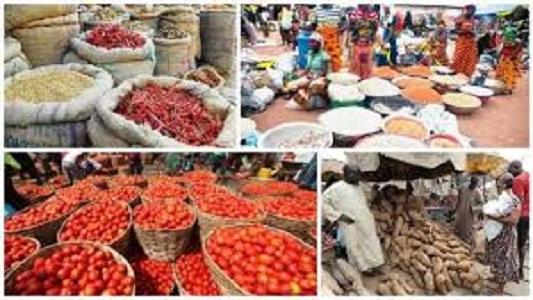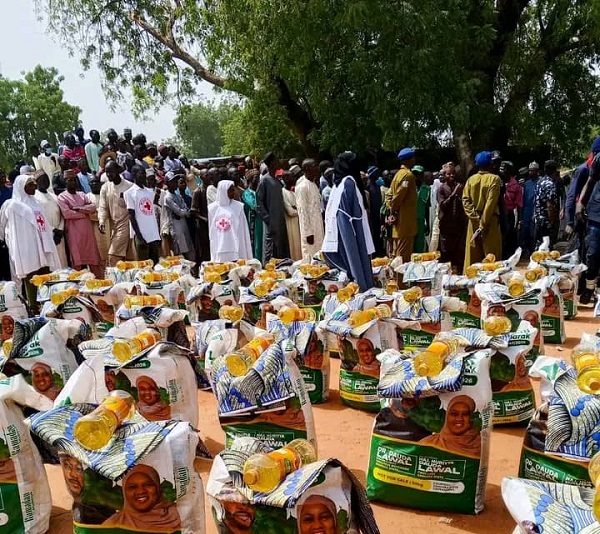Food insecurity looms amid inconsistent rainfall patterns

The current inconsistent rainfall patterns in the country may have a negative effect on food security, agricultural experts and farmers have warned.
“The inconsistent rain patterns we are witnessing has definitely affected food security and agricultural productivity in the country,” said Executive Director of Recycle Points, Adewole Taiwo in an interview.
He explained that the trend “is as a result of climate change effects. It is very glaring that climate change is real. We do not need to be told already.
We can see that the excessive rainfall that happened recently in the northern part of the country has affected agriculture, and livelihood of people and farmers.”
According to Taiwo, “Where there is lack of rainfall, cattle breeders also will definitely want to move their animals for grazing in the greener zone which is leading to the herdsmen/farmers conflicts.
The inconsistent rain patterns will even affect factories that rely on agricultural produce to operate. Feed stock would also be affected.”
But how can the development be reversed? He noted: “There are roles we humans can play in changing the inconsistent rain patterns.
We can achieve this through our actions. We must also stop deforestation activities, stop or reduce the use of fossil fuel, and adopt alternative renewable energy.
Everyone can see and feel the implications of the rain inconsistencies already; we do not need to be told.”
The environmentalist advised Nigerians to embark on rain harvesting to save water for agricultural activities.
He also advised that buildings and other obstacles found on drainage channels be removed, while clearing drainage and waterways ahead of heavy rains be pursued vigorously by individuals and government.
“Both the government agencies and individuals should take the responsibility of clearing up clogged drainages and waterways, all parties must be involved.
Once there is flooding, it will definitely result in a ripple effect on humans, crops and livestock. So many local farmers will also be out of jobs,” he warned.
Similarly, Oyo State Chairman, All Farmers Association of Nigeria (AFAN), John Olateru, said that inadequate rainfall was a big challenge for farmers in the South-West this year.
Olateru said in Ibadan that all the crops planted by farmers had dried up due to lack of rainfall.
“Farmers have to start all over; unfortunately, hybrid seed that can solve this problem is not readily available and where you are able to get it, it is at a prohibitive cost.
The government and Nigerian Seed Council need to be up and doing in the area of seed. “Situations where there are seeds that can provide a minimum of six tons per hectare, compared with the seed that will give you two tons with the same efforts require serious attention.
Seeds that will not give our farmers profitable yield should not be allowed into the market; the grain farmers need all the support they can get to mitigate the challenges they are facing,” he said.
Olateru urged the government at all levels to assist farmers in getting correct seedlings and provide highly subsidised fertiliser and chemicals to the farmers.
He appealed to the government to support farmers financially to mitigate the losses they experienced due to the COVID-19 pandemic and other related issues.
“For livestock farmers, it is unfortunate that all the companies the government issued import permit to are foreigners operating in the livestock industry, not a single Nigerian benefited from this.
They are competing with Nigerians; with what the government has done, they have been given competition advantages.
Nigerian livestock farmers are now at their mercies and this is a bad solution to the challenges at hand,” the association chairman said.
Olateru stated that the National Grains Reserve silos at Iyana-Church, Ibadan, which had been concessioned as a private company was a big mistake by the government.
“The silos are now being used to mop up grains from the market and manipulate the price of foodstuffs.
READ ALSO: ‘Food security may remain elusive’
These silos are better used for its original intention, which is for grain strategic reserve; that is, governments warehouse grains at the time of excess and release same at the time of scarcity.
Now there is scarcity, the government has little to nothing in their reserves to mitigate the challenges,” he said.
According to the chairman, the solution is that the government should bring back the commodity exchange board.
The exchange board is in a position to know what is being produced by farmers, what the consumers’ needs are and know if we have excess for export, or needed to import,” he said.










